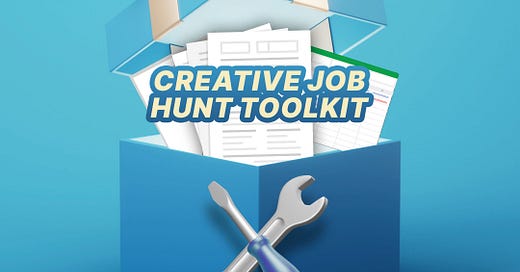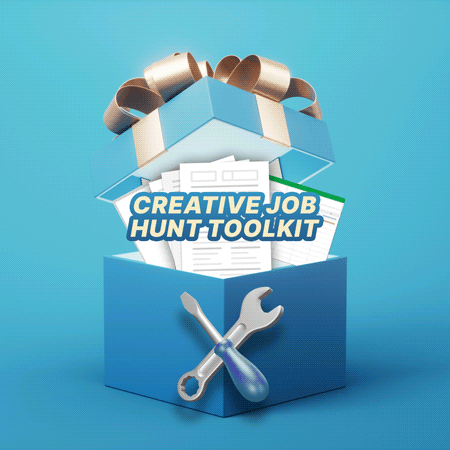Are you by chance looking for a role right now? I have a free guide for you that’s full of tips and support in this challenging time.
⏬ Scroll to the end for the FREE Job Tracker worksheets to help you kick butt at the application process.
1. Humans make offers, not software.
Cold-applying (that is, finding a post, uploading your resume and portfolio, and then doing nothing else) will likely not yield a ton of results. Part of your default action when applying for jobs should be seeking out a human being who works in the company you're applying to, either in HR or in the same department as the job, and following up with that person (email, LinkedIn, whatever). Don't email several times. Just a quick note to say you're super interested and you're wondering if they can point you in the right direction.
2. Join (free) private FB communities, Discords and Slacks related to your field and demographic.
For instance, there are several Product Design groups on Facebook and on Slack. There’s Open Animation, a Discord for people who are trying to learn animation skills. There’s Panimation, an organization for trans, female, and/or queer-identifying motion designers. There’s Where Are The Black Designers?, a community for BIPOC-identifying designers of all disciplines. Want to join a group for Women in Tech? There’s a Slack for that! There’s a (free to enter) community for anything you can think of, if you just search for it. Don’t pay expensive fees.
Why this is important: These communities generally have a "jobs" area that you can check out, and because it's a community you'll be able to see who posted what and get answers about if the job is still open. It’s also a great idea to use these communities to build your network so that more people think of you when something DOES come up.
Search “Groups” in Facebooks, but you can also just use google to search for Slacks and Discords.
3. Reach out to former colleagues, bosses, and recruiters you may have worked with.
People need to know you’re looking. If you’re not in an awkward situation (aka have a job already), post on your LinkedIn or FB or IG that you’re looking and provide a link to your portfolio. Your network is going to be the best source of leads.
4. Be able to demonstrate your abilities (usually with a portfolio).
This is table stakes, because most people will decide off the portfolio if they even want to talk to you at all. There are some finer points on how to structure one's portfolio that I'll put in a different care package if folks show interest.
5. Be discoverable.
Unfortunately it's a bit of a "buyer's market" out there right now. It means employers are able to passively wait for referrals to come to them or just search for available people on LinkedIn, etc and they don't necessarily have to go through a whole job posting process. So keep your LinkedIn, Dribble, etc up to date.
6. Write out the answers to a couple of key questions ahead of the interview.
The most important question you'll always be asked is..."Tell me about yourself. What's your experience?" — pre-write a few sentences summarizing your experience & skills. You can use Chat GPT to find other likely interview questions by feeding the whole JD into it for context and asking it to give you questions. But the most important answer you want to have memorized (or open on your computer while you're chatting) is "tell me about yourself." Your brain is gonna get scrambled because of nerves and it's really helpful to have it for reference.
7. Keep your resume in front of you or open on the screen when you interview.
Just like the point before this, it's an excellent cheat sheet for yourself to reference your past experience and help get through your nerves.
8. Fresher job posts are better.
Don't bother applying if the job posting is over two months old, and ideally apply right away when it's posted. Once you've applied and followed up with a human, if you haven't heard back in 2 months, mark it closed. This will help you be able to move on.
9. Write a bit of intro text to use for a "cover letter."
It's important. It can be the same as the "Tell me about yourself." The people reviewing these things have no time and they might be looking at 100s of entries. Make it easier for them by giving them a quick paragraph to scan. Customizing it per job is best, but if you have no time, just paste your general intro.
10. Be consistent and organized in your job search.
Apply to a few jobs per week while you're in a job search. Keep track of which jobs you've applied to, when, and the link to the posting. If someone from the job emails you back, bring up the job posting while you're chatting so you can make sure to emphasize all the skills they are looking for in the job.
⏬ FREE Job Tracker worksheets
Here's a Google Sheets job tracker I made for you to help you stay organized with your search. Click the button to copy your own version of it into your Google drive.
The Notion version of this spreadsheet is here. Note that if you click the down arrow to the right of the name of the sheet, you can toggle to “View by Status”, which neatly arranges them by whether they are active (eg if a human got back to you and scheduled an interview), closed, etc. If you want to use this one, make sure you dupe it to your private account so your job search details don’t become public info 😉.
11. Proactively cultivate an attitude of self-kindness and self-love when things don’t go your way.
Applying and interviewing is a marathon, not a sprint. Most of the applications you send won't get a response for various reasons. Sometimes, you’ll get an interview only to be rejected later on. Sometimes the interviewer themselves is rude or presumptive about your skillset. This can feel really degrading.
Reset your expectations: you can’t control other people, and there’s going to be some unpleasant interactions alongside the positive ones.
Have a realistic numbers perspective: you're honestly doing REALLY WELL if you get 1 or 2 responses per 20 applications.
Tweek your self-talk: You'll notice in my tracker I've written "not a fit" instead of something emotionally charged like "rejected" for when an interview doesn't lead to a job or you get an “No” email before you even get an interview. How you talk to yourself is really important when you are in this job-search mode. Be nice! As I say to my oldest: "I don't want anyone being mean to you, especially you."
Well, that’s the end of the goodies in this toolkit. TTFN!
-Cathy




